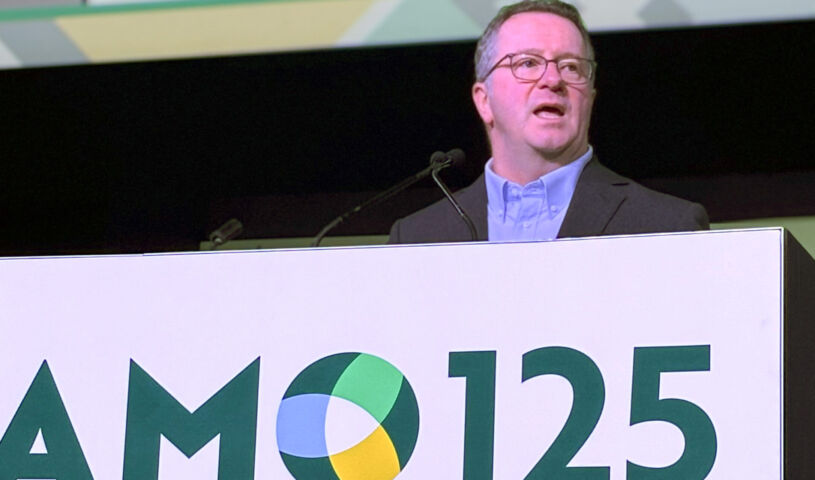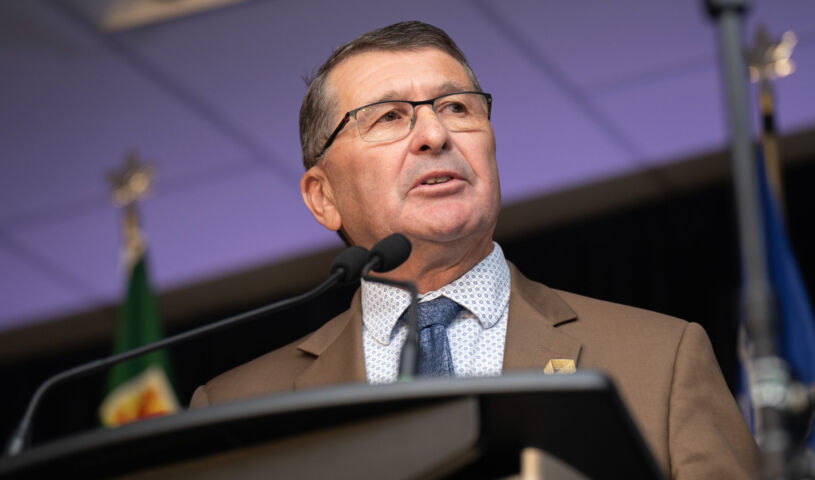AMO evolves into Ontario’s political Super Bowl
 Brian Rosborough, executive director of the Association of Municipalities of Ontario, was just one of the speakers at the organization’s recent conference in Ottawa. The 2024 conference set a record for largest attendance with more than 3,200 attendees. Photo: Megan Abraham
Brian Rosborough, executive director of the Association of Municipalities of Ontario, was just one of the speakers at the organization’s recent conference in Ottawa. The 2024 conference set a record for largest attendance with more than 3,200 attendees. Photo: Megan Abraham
The Association of Municipalities of Ontario (AMO) celebrated its 125th anniversary at its annual conference in Ottawa this month. Over the course of those 125 years, the AMO conference has become the Super Bowl of political meetings in Ontario.
Ontario’s political Super Bowl? Yes, because there are more elected people having more meetings than any other event in the province.
If there is any doubt, consider this: Premier Doug Ford and all opposition leaders address the conference. The entire Ontario cabinet attends and appears on stage to answer unscripted questions from delegates in a session officially known as “The Ministers’ Forum” and unofficially as “The Bear Pit.”
“We think of it as a moment of accountability in the municipal-provincial relationship,” said Brian Rosborough, AMO’s executive director. “It’s kind of like Question Period, but in front of a very much bigger live audience.”
Record Attendance, Important Topics
Perhaps even more significant are the hundreds of behind-the-scenes between municipal delegates and provincial government ministers as well opposition members. The number of meetings with government ministers numbered over 700.
Municipal delegates have the opportunity to request meetings on their priorities large or small, whether a big-ticket item such as a transit project or a smaller ticket item such as a highway median barrier.
“It allows delegates to bring very specific concerns to illuminate to the province very specific opportunities that may exist in their communities,” said Rosborough. “The truth of the matter is that municipal governments are involved in virtually every ministry.”
This level of accessibility is perhaps one of the major reasons that the conference drew over 3,200 delegates from across the province – a record number. One of the major objectives of the conference is to engage the provincial government in a “Social and Economic Prosperity Review.”
“It’s really about looking at the fiscal relationships that underpin the municipal and provincial relationship,” said Lindsay Jones, AMO’s director of policy and government relations. “That is, how can we figure out how to make this relationship the most sustainable, and the most affordable for everybody? We want to make sure we are delivering services in a way that ultimately benefits our communities economically and socially.”
Spending Outpaces Funding
The property tax base is the most important source of revenue for our municipalities, Jones said. “In Ontario, we have the second highest property taxes in the entire country. This is because, in part, unlike anywhere else in the country, municipalities in Ontario have responsibility for issues such as long-term care, social housing, ambulance, and public health, which everywhere else are paid for at the provincial level.”
Municipalities are providing services valued at $4 billion a year that are provincial responsibility and outpaces what they receive from the province in the form of grants, Jones said.
“The challenge with the property tax base is that it doesn’t grow with the economy and doesn’t grow with inflation. In the past few years when inflation has really ballooned, municipalities’ revenue has stayed the same while their costs went up.”
Property taxes also do not take into account people’s ability to pay, Jones said. “It’s all tagged to the value of your property as opposed to your income. It’s not a progressive tax in that sense and therefore ill-suited to things like income redistribution and paying for social housing and income support.”
Municipalities are grappling with issues that they are not financially equipped to deal with.
“It has been the case definitely since the pandemic that homelessness has been the number one issue for municipalities everywhere,” said Jones. “It’s very much a factor of a lack of investment at the provincial level in income security, in the creation of affordable housing and in mental health and addictions for the past 30 years.”
The review AMO is seeking now would be an update on a similar exercise that was done 15 years ago, Jones said.
“As AMO, working with the province, we’ve done this before quite successfully,” Jones said.
“It was a process whereby all the public service expertise came together with all the municipal staff expertise and data and under a charter setting out principles and under the leadership of a joint municipal-provincial political steering committee came up with consensus recommendations about how to proceed. In our ideal world, that’s what we would do. We see that as the most collaborative approach.”
Calls for Code of Conduct
Another priority of AMO is seeking updated Code of Conduct legislation for municipalities ensuring there are consistent standards and enforcement mechanisms for ethical conduct. It was an issue upon which Municipal Affairs Minister Paul Calandra was questioned at the Minister’s Forum. He responded saying more consultation is needed.
A non-partisan group called “Women of Ontario Say No” has been advocating for legislation. A private member’s bill sponsored by Liberal MPP Stephen Blais was voted down by the government in the spring.
NDP MPP Jeff Burch has brought forward another private member’s bill addressing the issue. Blais has said he supports Burch’s bill and Burch has said he would welcome the government taking up his bill.
“It’s something that our members care deeply about,” Jones said. “Both mayors and councillors come to municipal politics because of the values that they have. They have a commitment to community. When there is behaviour that is inconsistent with strong values, it is something that municipal governments are really looking for the ability to act.”
Virtually every municipality in Ontario belongs to AMO. The notable exception is the City of Toronto, which left about 20 years ago under Mayor David Miller.
The AMO annual conference returns to Ottawa in 2025. MW
✯Municipal World Executive and Essentials Plus Members: You might also be interested in Mark Mullaly’s article: Strong mayors: What regional roadblocks?
Greg Crone is Executive Editor of Municipal World.
Related resource materials:



